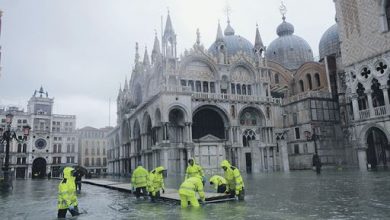EU Commissioner for Economics and Monetary Policy
Joaquín Almunia Amann: alternative energy sources could not be developed at an oil price of $ 20.
Spaniard Joaquin Almunia – EU Commissioner for Economics and Monetary Policy. His duties include monitoring the implementation by the EU countries of the general rules. Now Mr. Almunia’s attention is focused on inflation, which threatens to slow down economic growth in some of the largest EU countries. Of particular concern to consumers is the rise in prices and rates on mortgages.
EuroNews: Mr. Commissioner, welcome to EuroNews. If we talk about oil, should we get used to this price level?
Joaquin Almunia: I do not know exactly what level, but, I think, we are now living in a period of more expensive oil than in the past. And this will continue because, on the one hand, there is a very high demand, the economy is growing rapidly and, I hope, will continue to grow, new countries have appeared that consume a lot of oil – China, India and other developing economies. On the other hand, limited production capabilities confront these circumstances. Therefore, we are going through a period of more expensive oil with certain difficulties, but at the same time there are some benefits. Let’s look at one of these advantages – this is a real incentive for the development of alternative energy, non-hydrocarbon, without carbon dioxide emissions into the atmosphere, the best from an environmental point of view. From an economic point of view, it would be impossible to develop alternative and renewable energy sources at an oil price of $ 20.
EuroNews: But this is the problem for European citizens, right?
Joaquin Almunia: In the short term, this is undoubtedly a problem. We see how energy prices have risen, and how they are driving prices for oil-dependent products. And this situation will continue until oil prices remain high. But this opens up new possibilities. For example, after the first oil spurt in 1973-1974 to date, we were able to halve the amount of oil we need in production. We must continue this, and not only because it is expensive energy, but also in connection with environmental problems.
EuroNews: Does financial speculation play a role in this?
Joaquin Almunia: This can only partially affect the price increase. But, I believe that this is not the only reason. In fact, there are other factors, such as security, difficulty in supply, the structural factor of the oil refining industry, but also financial speculation.
EuroNews: Rising oil prices, as well as food prices cause a risk of inflation. This is very worrying for European consumers. What do you think about this?
Joaquin Almunia: Undoubtedly, an increase in oil prices is associated with an increase in the prices of other goods and food. Inflation in the euro area rose from August to the end of 2007 by 1%. Prior to this, its level was in the region of 2% and even went below this mark, but at present it has reached 3.1%. But this is not only happening in Europe or in the eurozone, it is happening all over the world.
EuroNews: Many citizens from the eurozone countries believe that the European currency itself has an impact on price increases. Do you think this is so?
Joaquin Almunia: Of course, price changes occur when switching to a new currency. This took place in 2002, it is happening now in Cyprus and Malta, as it was last year in Slovenia. But the basis of price increases is the increase in prices for oil or other commodities, a very high demand or a deficit. But, as our experience shows, with the introduction of the euro, a rise in prices is without a doubt real, but it is much lower than the rise in prices that occurred before switching to the euro.
EuroNews: Do you think that in this case political intervention would be advisable, as many in Europe believe?
Joaquin Almunia: I think that in Europe there is not only a political agreement in the form of the Treaty of Independence of the European Central Bank, but, besides, outside this treaty, there is a wide understanding that we are interested in an independent Central Bank.
EuroNews: You do not think that Europe is more likely disappointed with the economic downturn, because economic growth was expected before the summer?
Joaquin Almunia: A few months ago, before the summer, we thought that in 2008 the economies of Europe and the euro area will continue to grow, although it will not be as fast as in 2007, because the economic cycle is moving forward and the economy simply cannot constantly grow at the same pace. Now the prospects are worse than a few months ago due to a whole series of circumstances, such as the crisis in the market for unsecured mortgages in the USA, the impact on the financial markets of the economic crisis caused by mortgage collapse. As a result, there is a loss of confidence in leading financial players. Accordingly, the conditions for lending to each other’s banks were tightened and this naturally led to more stringent conditions for financing the economy.
EuroNews: In the past, we saw that in many cases crises in the world were triggered by poor functioning of the credit sector. Don’t you think that the new system of coordination of the world economy will have to confront the credit problem at the global level?
Joaquin Almunia: Much of what has played a role in the past may disappear as a result of this renewal process, the process of change, and adaptation to new conditions. Currently, you can see that because of these financial troubles, there are so many financial institutions that suffer losses, but there are others who benefit from this. It is likely that some financial products will be hit in this process. Now there are ideas, initiatives and suggestions for improving the quality of observation, improving the work of rating agencies. Therefore, in a few years we will see another financial system, more effective than the current one.
EuroNews: Do you think control is needed?
Joaquin Almunia: Better regulation, better supervision and more transparency in the markets are needed.
This post is also available in:
 English
English  Русский (Russian)
Русский (Russian)


